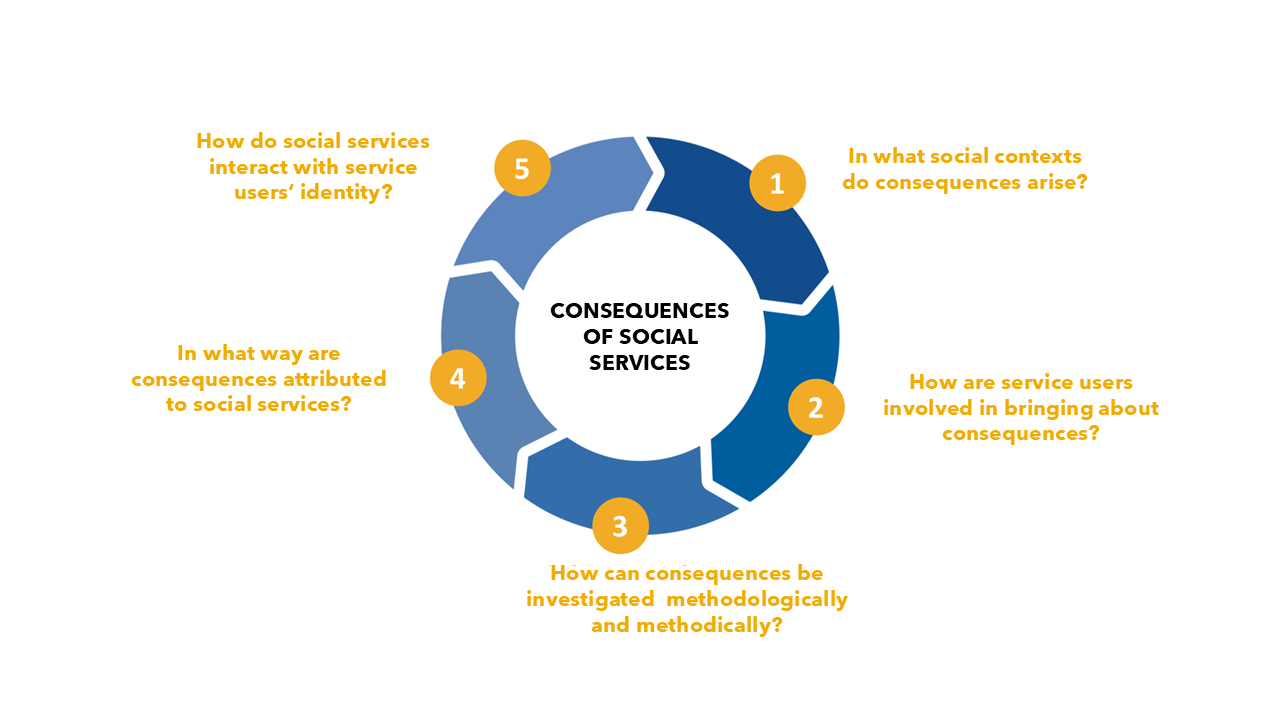Researching the Consequences of Social Services
Social services derive their legitimacy from their objectives, such as inclusion, participation, rehabilitation, child welfare, education, well-being, or mental health. This applies to all areas of study within GRK 2493—whether in the context of disability support, assistance to refugees, criminal justice interventions, child and youth services, community work, school-based programs, or psychotherapy.
Consequences of social services differ from these intended goals. They can be intended or unintended, desirable, undesirable, or ambivalent. This is partly due to the fact that service users participate in the production of consequences. Additionally, the social contexts in which these services operate also play a role. Some consequences arise directly from interactions between professionals and service users, while others only become visible later, through biographical reflection. Studying such effects requires an open research approach and research designs taking this openness into account.
Research Projects of Doctoral Students & Postdocs
Consequences of resocialization: Juvenile prisoners between the right of reintegration and the protective interests of the society

Using the example of the “Jugendstrafvollzug in freien Formen” (a technical term for a specialised institution for young prisoners in Germany that provides a certain degree of self-determination during the process of resocialisation), this proposed research project intends to focus on young prisoners as addressees of these educational and resocialization measures. The specialised institutional format is supposed enable the addressees to take on responsibility in regard to their own consequential measures and position themselves as actors during the process of their resocialisation based on their individual background and available resources. The research utilises a qualitative-reconstructive research design to investigate individual consequences for the addressees, while taking the educational-supportive framework of a youth prison into account. Therefore, this multidisciplinary study project touches upon educational science as well as theories related to legal sciences.
Consequences of the probation service for its addressees and their social network

In Germany probation service as part of social work in the criminal justice system represents the most important alternative to the penal system. According to the law, the live circumstances of the convicted person play an important role in the suspension of sentence (section 56 of the German criminal code). Following the guidelines from the DBSH (a German professional association of social work), the relatives of the person on probation are also included in the practical probation period. This doctoral thesis focusses on the interface between probationary service work and the social network of its addressees and considers potential interactions. The research project aims to discover implications and consequences the probation service might have for its addressees and their social relations. For this purpose a qualitative network research using case comparison will be conducted.
Embodied consequences of social services work – Socio-pedagogical fan projects and the construction/transformation of social orders

In this dissertation project the perspective is taken that social action, which includes meaningful action related to other persons, is always marked by a bodily aspect. Therefore it is assumed that also social services work, which is oriented towards its addressees, is bodily steeped. Which consequences of social services work arise in the context of bodily representation, construction and possible transformation of social order is an empirically open question. Based on the work of socio-pedagogical fan projects, the qualitative research design aims to show how the social services work is embodied by the addressees and how the consequences affect the construction/transformation of the addressee’s social reality. Especially the bodily impulse and experience of the fans in the context of football and the accompanying work of the fan projects establish the opportunity to explore the embodied consequences of social services work in differentiated manner.
Consequences of social services work in the context of social urban development

Since the late 1990s, the policy field of social urban development has received a lot of attention in Germany as a reaction to the increase in social inequality. In such political programs the fields of action of social services work and urban development are programmatically linked: Supported areas should not only be upgraded in terms of urban development and infrastructure, the aim should also be to improve social stability and life opportunities of the local population in these districts by promoting institutions such as neighborhood management, social space work and/or community work. The starting point for addressing is a specifically delimited space and thus the entire population of this space, regardless of the individual use or non-use of social services work. The qualitative research project focuses on spatially located social services work in areas where social urban development is programmatically targeted. The aim of the project is to examine consequences of spatially located addressing processes in social services work against a sociological background. The consequences are explored from the perspective of the addressees.
Consequences of social situation-based health promotion

An increasing health inequality is observed in Germany. With the entry into force of the Prevention Act (PrävG) at the beginning of 2016, the social situation and non-medical health promotion were strengthened. By promoting the self-determined health-oriented actions of the addressees, a contribution should be made to reducing socially-related inequality of health opportunities.
Although empirical studies show that economically disadvantaged population groups do not benefit from the universally oriented health promotion, there are few empirical clues about the considerations of the addressees, their motives and decisions regarding the use or non-use of the offers. What the appeal through the field of social-related health promotion means for the addressees and which consequences they make relevant for their (healthy) life or not, has not yet been empirically investigated so far. It should be the subject of the research work.
(Re-)Constructions of Being A Parent as a Consequence of Residential Child Care
The main purpose of residential child care (Heimerziehung) is to ensure the wellbeing of children and adolescents as well as to promote their development, education and participation. In addition, child and youth welfare services shall improve upbringing conditions in birth families. In impact studies on residential child care, which focus on the biographical development of young people, co-operation with (birth) parents is recognised as an important impact factor. Careleaver research and discourses on ombudsmanship in child and youth welfare offer an increasing insight into young people’s perspectives on residential child care (and other forms of upbringing support). How (birth) parents experience residential child care is empirically underrepresented in youth welfare research. The research project focuses on this perspective and examines the consequences of residential child care for parents as addressees of this social services work.
The dispositive of the addressee of youth welfare services (co-)initiated by schools

According to german child and youth welfare statistics, the number of procedures initiated by schools to assess a risk to the well-being of a child (§ 8a SGB VIII, German Child and Youth Welfare Code) has risen significantly in recent years. If there is a need for support from the point of view of the youth welfare department, welfare services are often installed. Which mechanisms are relevant that pupils become addressees of child and youth welfare services, is an empirically open question. By using a dispositive analysis this habilitation project will focus how the ‘dispositive of the addressee of youth welfare services (co-)initiated by schools’ is constituted in its powerful connections. In this way, primary and secondary consequences that arise within this complex process for the addressed pupils and other dimensions of the dispositive, e.g. school, youth welfare department or the social welfare service, can be taken into account.
Subjectivation processes of young users in educational landscapes in campus form

Educational landscapes combine formal and non-formal educational settings (e.g. schools and juvenile facilities) into a comprehensive concept of education that encompasses both formal and informal educational processes. A special feature is the cooperation of different educational institutions within a pedagogically designed spatial area, e.g. in the form of a campus. How young people are produced as users of educational landscapes in campus form has not yet been empirically researched in detail. Therefore, subjectivation processes by and through users are the focus of this doctoral thesis. Accordingly, (self-)subjectivation of young people and (external) subjectivation of users by pedagogical experts will be investigated in order to illustrate the consequences of this process.
Organization and participation – the participation imperative in residential childcare services
Social services as publicly provided ‘pedagogical welfare interventions’ are always an expression of ideas about successfully living together. In this context, social services in democratic welfare states are confronted with the demand to enable and guarantee participation of their addressees. The project investigates how the many and varied opportunities for participation and freedom of action provided by the law and implied by professional standards are perceived by the children and young people in the various residential childcare services. With the help of a qualitative-quantitative mixed-methods design, the participation experiences of the addressees will be examined in the context of organizational structures of out-of-home care in England and Germany in order to consider the consequences of the ‘participation imperative’ for the structure and practice of residential childcare at a bi-national level.
Processes of Social Differentiation in the Participatory Design of Services in Open Child and Youth Work

Open child and youth work pursues the programmatic goal of aligning itself with the interests of its target group and addressing all visitors equally. This implies that all young people have a right to participate in the structural co-determination and content of the programmes. Based on the assumption that differentiations are constitutive for social situations, mechanisms of social differentiation processes in the participatory design of open child and youth work are examined. The mechanisms can be explored with an ethnographic approach to be able to highlight everyday practices within youth work in the context of participation and the differences that become relevant with regard to the children and young people. This perspective makes it possible to reconstruct to what extent consequences arise for the addressees of youth work within the framework of the observed practices.
The Consequences of Self-Guided Digital Treatment for Patients with Panic Disorder and Agoraphobia

The shortage of treatment capacities in Germany has led to an average waiting time of five months for individuals in need of psychotherapeutic support. Current research suggests that symptoms of panic disorder and agoraphobia often worsen if they remain untreated. To address this outstanding issue, self-guided digital short-term treatments have been permitted that only need to be accompanied by few psychotherapeutic sessions. Via psychoeducation and virtual reality exposure therapy, the treatments are aimed at reducing psychological symptoms for panic disorder and agoraphobia. As it has not been the target of experimental research yet, the present project investigates the efficacy (= intended consequence) of self-guided digital treatment with virtual reality elements for patients with panic disorder and agoraphobia. To detect further (unintended) (secondary) consequences of the treatment, qualitative interviews with patients are embedded in the study design.
Effects of computer-assisted psychotherapy for therapists as addressees

The prevalence of anxiety in Germany contrasts with the number of free therapy places available. Many people with anxiety disorders experience long waiting times for a therapy place. Sometimes therapy is not even started because of this. Computer-assisted treatments, which can be used (partly) without the presence of a psychotherapist, make it possible to harness therapy at home. This could reduce and bridge waiting times and relieve therapists.
Previous studies mostly focused exclusively on the effect of therapy on patients. This research project focuses on the perspectives of therapists as addressees of computer-assisted psychotherapy. Data will be collected via a mixed-methods design. This enables the collection of (non-)intended (side-)effects from the therapists’ perspective by means of qualitative methods, which are related to quantitatively determined intended effects on the patients.
Self-empowerment in the restrictive refugee migration regime – consequences of empowerment-orientated social services work

Social services work for refugees are particularly exposed to the socio-pedagogical dilemma of help and control: while on the one hand the addressees are considered to have a high need for support, they are confronted repetitively with governmental and social restrictions on the other hand. The resource-oriented empowerment approach addresses this potential conflict with the aim of (collective) self-empowerment. In the academic discourse this approach is criticized, especially because of its insufficient foundation in power theory. The aim of this dissertation is to analyse which understandings of power underlie empowerment projects aimed at refugees. The focus is on the reconstructable consequences in the context of ascribed power (to act) from the perspective of the addressees by means of a qualitative research design.
Gendered consequences for legal guardians as addressees of socio-pedagogical family assistance

Family and the associated gender-specific attributions are normative constructs that are constantly changing. In addition to the pluralization of family constellations, the demands on legal guardians and the need for educational assistance are also multiplying. In the discourse on outpatient educational assistance, a ‘gendering’ of socio-pedagogical diagnoses and aid planning with regard to the children and adolescents addressed is becoming apparent. The investigation of legal guardians as addressees of educational assistance from a gender-sociological perspective, on the other hand, has received little empirical attention so far. In this doctoral project, a qualitative design will be used to investigate whether, and if so, how gender constructions are produced in the context of socio-pedagogical family assistance and become effective in the form of (side) consequences for the identity and living conditions of the addressed legal guardians.
‘Self’ as consequence of self-help
Self-help works by uniting individuals into homogenised groups with regard to a problematised characteristic description. This mechanism of action, which is often not questioned in impact studies, is to be reflected in this research project in order to enable an empirically and theoretically saturated description. A major concern is to reconstruct group formation and the construction of a ‘Self’ as subject of self-help. Using a qualitative approach, group formation is viewed as the result of constitutional processes based on descriptions of characteristics. Against this background, the questions will be examined as to which (meaning) attributions the addresses constitute the group as a ‘Self’ and how these processes can be reconstructed in their consequences.
Flight Without Arrival: Forms of Help as Political Moments in Encounters

This study examines the phenomenon of “flight without arrival” using the example of refugees in Germany. It focuses on the political moments in which refugees develop their own agency despite restrictive migration policies. Based on Hannah Arendt’s concept of politics, which emphasizes collective action and speech among people in relation to a shared world, the study empirically reconstructs how refugees in precarious life situations attempt to establish connections to a common world.
Methodologically, the study draws on Kathy Charmaz’s constructivist Grounded Theory and continuously interrogates the relationship between empiricism and theory. Through problem-centered interviews with refugees from various countries of origin, biographical ruptures and transformation processes are reconstructed—processes that disrupt the “wholeness of life” of those affected and dissolve their previous self-world relationships. In line with theoretical empiricism (Kalthoff/Hirschauer), interpretations are understood as a “conversation” in which theory and empiricism mutually shape and transform each other.
The central findings reveal that help manifests in fleeting moments of interpersonal encounters, which can be described as “narrow bridges.” These bridges emerge when refugees establish connections through collective action and speech.
Consequences of outpatient social services for its addresses in rural areas

Rural areas make up the majority of Germany’s territory; more than half of the population in Germany lives in the countryside. Despite this fact it is remarkable that social services in rural areas have hardly been systematically researched empirically. At the same time, in professional, scientific, political and social contexts, rural areas are attributed numerous specific characters that would challenge addressees, professionals and municipalities. The aim of the qualitative dissertation project is to examine the consequences of an attributed ‘rurality’ from the perspective of addresses of outpatient social services in rural areas.
Flexible Assistance and its Consequences for Addressees in the Context of Youth Services Work

“Flexible assistance” emerged from a reform discourse in youth services work and aims an alternative organizational design of youth services work. The idea is that assistance should be oriented to the (also changing) needs of the addressees in a “learning” way. In this way, flexible assistance – in contrast to the pillarized youth services – aims to avoid dropouts and thus create continuity in the process of assistance. The perspective of the addressees on flexible assistance and its consequences has hardly been researched so far. The qualification project first reconstructs possible forms of flexible assistance on the basis of interviews with professionals. Using a biographical approach, the consequences of flexible assistance are reconstructed from the perspective of the addressees in these potentially heterogeneous forms of flexible assistance.
Consequences of digitalisation processes on media practices of youth work addressees
The dissertation project focuses on the developments and transformations of youth work in context of digitalisation processes. The principle of youth work is to build on the interests and needs of young people and to gear the services to these. As young people’s everyday practices are increasingly media-related, youth work is required to integrate digital technologies and media into their work and to deal with the challenges caused by digitalisation. The research project aims to find out about the (un-)intended (secondary) consequences of these developments by investigating media practices of professionals and youth people as addressees of digitalisation in the context of youth work using ethnographic approaches in physical and virtual space.
Consequences of One-to-One Support by Teaching Assistants from the Students' Perspective

The right to inclusive education for all, as enshrined in the UN Convention on the Rights of Persons with Disabilities (UN CRPD), has led to an increased use of support staff (teaching assistants) in the context of inclusive school development. Legally anchored in German social law (§ 35a SGB VIII and § 112 SGB IX), this type of support is individually requested, approved and is therefore predominantly implemented in practice as one-to-one assistance.
While this form of support has been widely examined—and often controversially discussed—within academic discourse, the perspectives of the supported students themselves remain empirically underrepresented.
This dissertation project addresses this research gap by placing interviews with supported students at the center of a qualitative study. Methodologically, the project is guided by the principles of Constructivist Grounded Theory (Charmaz), which emphasizes participants’ subjective perspectives. The aim is to explore both positive and negative, intended and unintended consequences of individual school-based support from the viewpoint of the students receiving it.
Conversation-analytical impact research in victim-offender-mediation
Victim-Offender Mediation (VOM) as an alternative to the traditional punitive justice, is a victim-centred restorative justice procedure. It pursues ambitious goals for the healing process of a conflict between the offender and the victim. Despite the effectiveness and the chances that research results have shown so far, they do not explain how an agreement between the parties is actually reached interactively. To address this desideratum, a conversation analysis of VOM mediation conversations is used to reconstruct this process. The comparative case analysis also includes the reconstruction of the interactively produced social order and the examination of factors that influence the reparation process, such as the relationship between the conflict parties. In the retrospective, narrative interviews will be conducted with the participants in the VOM in order to understand the consequences of this social service from the reality narratives of the addressees. Finally, the interviews are related to the findings of the conversation analysis.
Consequences of low-threshold settings in homeless services

Low-threshold services for the homeless are usually particularly oriented toward the life-world (Lebenswelt) and acceptance of people in difficult and stigmatized situations. These target groups are often considered ‘hard to reach’ for other forms of social assistance. Since low-threshold services for the homeless are not (directly) aimed at changing the behavior of its addressees, questions about the goals and consequences of such services are especially relevant. However, little research has been done on what homeless assistance in general, and low-threshold approaches in particular, mean for their addressees. Against this background, this research project follows a qualitative and explorative approach to analyze the (un)intended consequences of low-threshold settings in homeless assistance.
'Neutrality' as a non-professional interpellation to youth work and its consequences for the professional and self-image of professionals and young addressees

‘Neutrality’ as an appeal to youth work from outside the profession and its consequences for the professional and self-image of professionals and young addressees. In recent years, there has been an increase in political interventions into the field of youth work, particularly in the context of extracurricular political education.
In doing so, a supposed requirement of ‘neutrality’ requirement is constructed and/or its violation is problematized. Of central interest to the research project is the consequences of these interpellations for ‘neutrality’ as perceived by youth work professionals and addressees of youth work and how they position themselves in relation to these invocations. In an empirical double perspective, first the power effects of the discourse of supposed neutrality in political education work will be worked out. Subsequently, the (professional) self-relations and subjectivities of the invoked professionals and young addressees are reconstructed.



